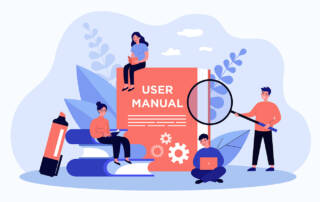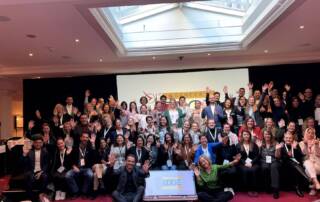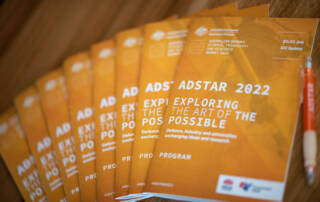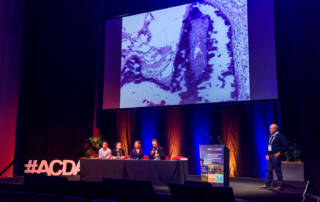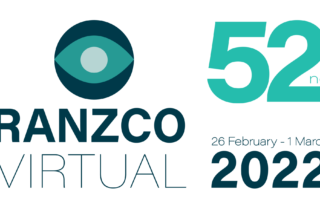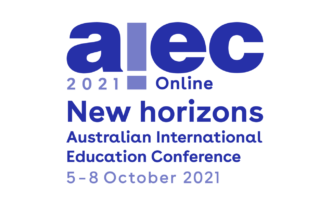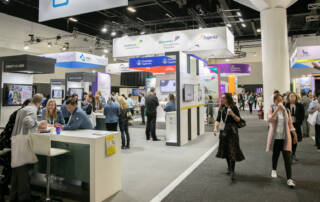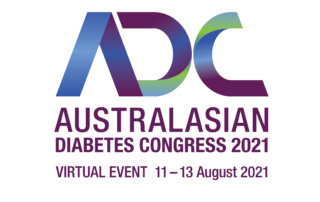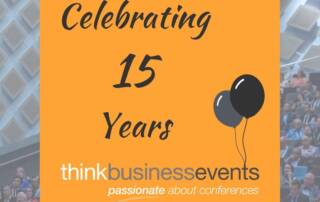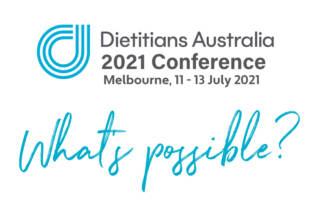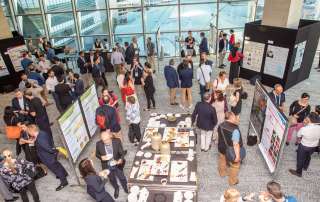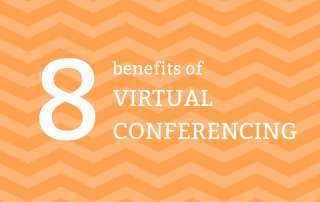The future of conferences
Events is a continuously developing industry, with new technologies and trends emerging each year. We sat down with Think Business Events Directors, Kim Stevenson and Denise Broeren for their take on the future of conferences.
We’ll start with the big question, what does the conference of the future look like?
K: In the immediate future; branded face masks, name badges or lanyards that alert people if they are not social distancing, and colour coded wrist bands alerting others if they are open to handshakes (green), elbow bumps (yellow) or not open to interacting (red).
D: More long term, more technology to facilitate connection and discussion, and sustainability initiatives such as plant-based menus and repurposing delegate materials.
Trends are always a big influence on current and future events. What is your favourite conference trend at the moment?
D: My favourite is the silent conference. Where you have one large room with multiple speakers on multiple stages and the audience are equipped with headsets to tune into their preferred speaker. I think it’s a great antidote to FOMO, listening to one speaker but hearing others in the crowd laughing – simply switch channels to find out what you’re missing out on!
K: I was going to say silent conference but, since Denise has beaten me to it, I’ll say the opportunity to expand the delegate reach with online events to audiences that we have not been able to reach is exciting. And we’re also looking into new online simultaneous translation technology that allows to expand the reach even further to non-English speaking audiences.
What trends do you think will stick around and become permanent features?
K: Not event related, but I think that working from home will continue in the future as it has now been proven it can work effectively on a large scale. This will progress to attending conferences online.
The current pandemic has also highlighted the need to accurately track delegates and I think this will become a common feature in future.
D: Enabling meaningful interactions, between attendees and speakers, and between delegates. I think this will be especially so if we do see more online meetings in the immediate future.
What do you think is the “next big thing” for conferences?
D: I think there are going to be two big things coming out of the COVID situations; 1. increased demand for hybrid conferencing, especially to capture international and regional audiences who will have difficulty travelling. The hybrid model also offers a value add for face-to-face attendees with access to recorded sessions.
And 2. we will have to “up the ante”. Delegates emerging from COVID are hungry for opportunities to meet, network and connect, but will also be scrutinising the time and cost of conferences. We need to deliver value and facilitate meaningful interactions to justify the costs by offering more than would ever be available solely online.
K: For the near future, I agree, hybrid and online events are going to be a majority. For hybrid events we need to carefully consider where the primary audience sits – face-to-face or online – and adjust our planning accordingly.
Jumping from that, I think that speaker training is going to become a key component of the planning for hybrid events. Speakers will need to learn how to connect with the audience through a camera, not just present to them, and facilitating this will be key to delivering value for online attendees.
What do you see as an upcoming challenge for conferences?
K: Currently, changing the perception that online content should be free and convincing delegates to pay for online events. Being able to provide ROI for delegates, sponsors and investments will be an ongoing challenge.
D: I think doing hybrid well. Hybrid is going to be a necessity for the immediate future but it should not undermine they key elements, or detract from the value, of a face-to-face event.
Another challenge is innovating each year, not producing the same formula. Delegates should be able to come each year and know there will be something new and exciting, not just in content, but in value and delivery and connection. We are fortunate that we do many national events year in year out and so have options to look at ways to improve and innovate each year, in big and small ways.
What does the future of event planning look like? And what does this mean for conference organisers?
D: Technology, technology, technology!
K: I feel we are becoming more like a movie director, not just a conference organiser. And similar to Denise’s comments, we need to embrace technology quicker and give things a try even if they are not 100% proven.
What can conference organisers do to be best prepared for the future of events?
K: We need to be agile and plan conferences in a way that if they need to change at a moment’s notice we are ready to do that.
D: We need to keep on the lookout for new ideas in the industry – from suppliers, other events, other organisers – and think creatively. We need to look at the issues and challenges we have now and find solutions to overcome and streamline.
Think Business Events are passionate conference specialists. Contact us to talk about your upcoming event today!
Read More of Our Event Thoughts
- Think Business Events Partners with Hidden Disabilities Sunflower to Enhance Accessibility at EventsKim Stevenson2024-11-25T15:30:49+11:00
Think Business Events Partners with Hidden Disabilities Sunflower to Enhance Accessibility at Events
- How To Prepare When Attending Your First ConferenceKim Stevenson2023-03-20T16:07:18+11:00
How To Prepare When Attending Your First Conference
- Kim’s trip to Geneva and the IAPCO EDGE SeminarKim Stevenson2023-01-27T15:19:43+11:00
Kim’s trip to Geneva and the IAPCO EDGE Seminar
- We asked some of our team ‘What’s in your conference kit?’Kim Stevenson2022-11-21T14:46:55+11:00
We asked some of our team ‘What’s in your conference kit?’
- 6 important things to remember when organising an international conferenceKim Stevenson2022-09-30T16:51:56+10:00
6 important things to remember when organising an international conference
- Case Study: The Australian Defence Science, Technology & Research SummitKim Stevenson2022-10-10T10:47:15+11:00
Case Study: The Australian Defence Science, Technology & Research Summit
- Case Study: The Australasian College of DermatologistsKim Stevenson2022-06-09T11:55:32+10:00
Case Study: The Australasian College of Dermatologists
- Case Study: Royal Australian and New Zealand College of OphthalmologistsKim Stevenson2022-04-07T17:11:31+10:00
Case Study: Royal Australian and New Zealand College of Ophthalmologists
- Case Study: Australian International Education Conference 2021Kim Stevenson2022-02-03T13:17:15+11:00
Case Study: Australian International Education Conference 2021
- 18 months of virtual and hybrid conferencing – these are our top 5 takeawaysKim Stevenson2022-09-27T12:46:37+10:00
18 months of virtual and hybrid conferencing – these are our top 5 takeaways
- Returning to face-to-face events 2.0admin2022-09-27T12:45:07+10:00
Returning to face-to-face events 2.0
- Case Study: Australasian Diabetes Congress 2021Kim Stevenson2022-09-27T12:44:30+10:00
Case Study: Australasian Diabetes Congress 2021
- Celebrating 15 years of Think Business Eventsadmin2021-09-22T14:50:01+10:00
Celebrating 15 years of Think Business Events
- Case Study: Dietitians Australia 2021Kim Stevenson2022-09-27T12:43:44+10:00
Case Study: Dietitians Australia 2021
- Exploring the new world of hybrid eventsKim Stevenson2022-09-27T12:42:53+10:00
Exploring the new world of hybrid events
- Returning to face-to-face eventsKim Stevenson2020-09-02T11:55:48+10:00
Returning to face-to-face events
- Our favourite virtual sponsorship opportunitiesadmin2022-09-27T12:35:50+10:00
Our favourite virtual sponsorship opportunities
- What’s the difference between a webinar and a virtual conference?admin2022-09-27T12:33:27+10:00
What’s the difference between a webinar and a virtual conference?
- Five Stages of the Conference Marketing Cycleadmin2022-09-27T12:27:59+10:00
Five Stages of the Conference Marketing Cycle
- Working from home: Staying productive and connectedadmin2020-04-06T17:26:27+10:00
Working from home: Staying productive and connected



